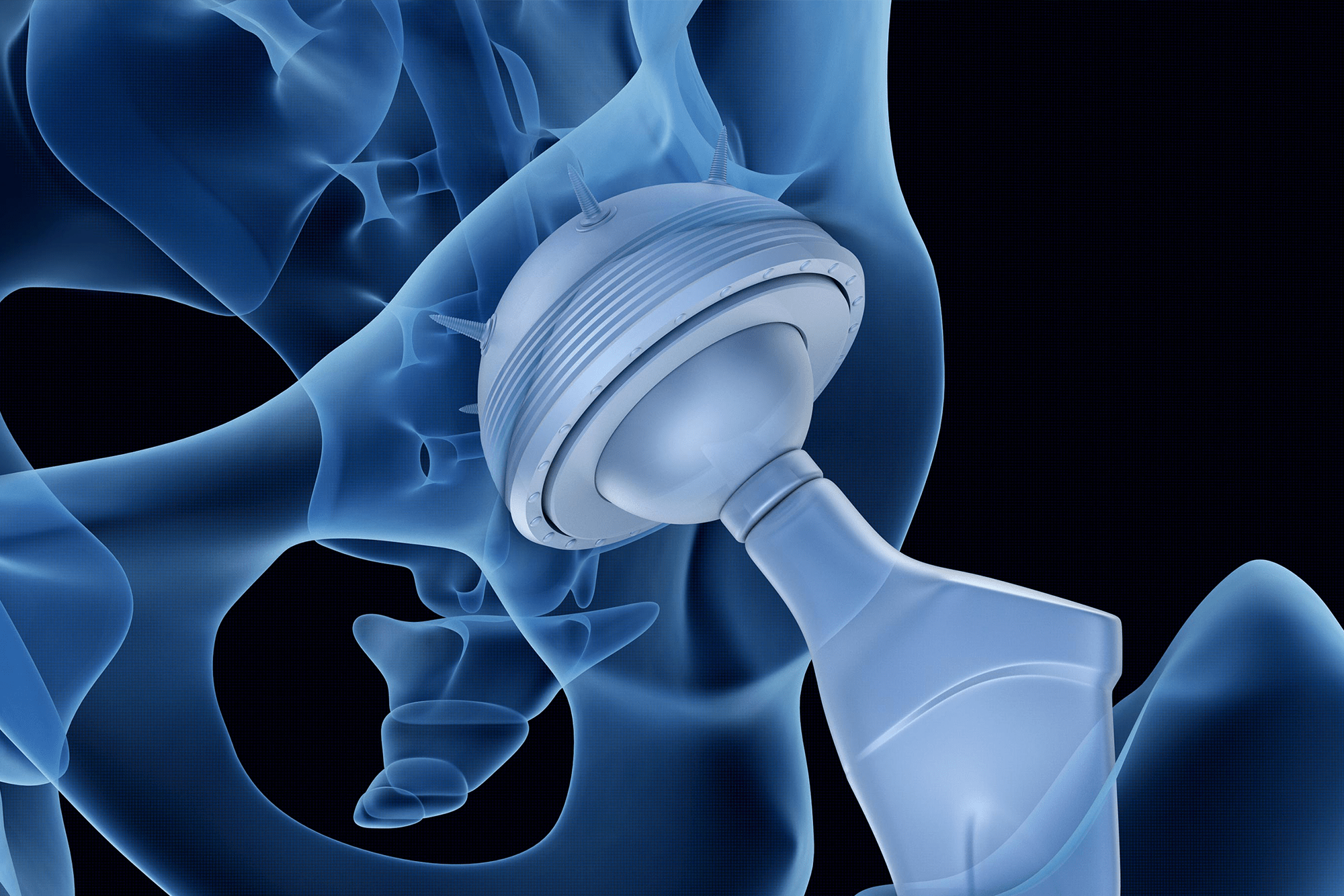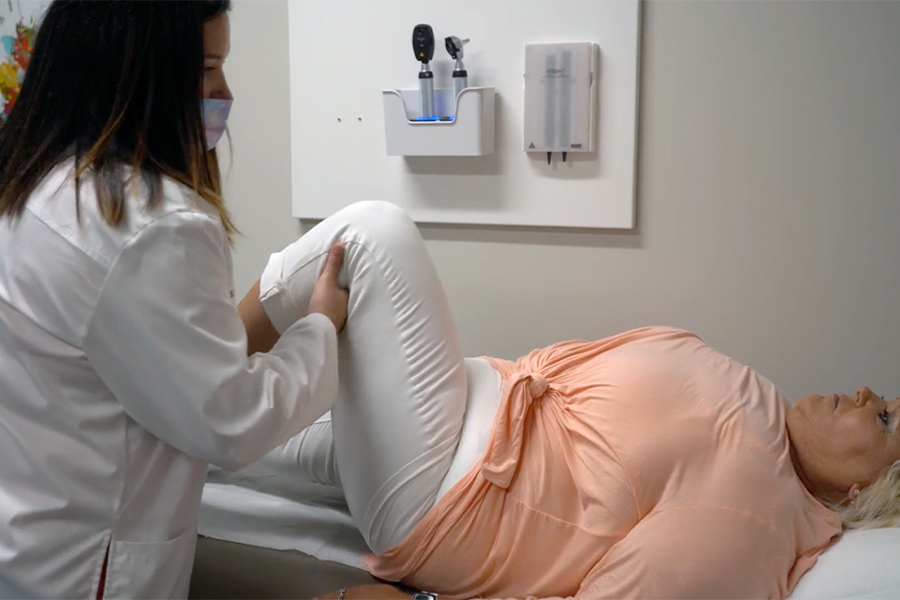- What happens during hip replacement surgery?
- What is recovery like after hip replacement surgery?
- How quickly will I feel better after hip replacement surgery?
Hip replacement surgery is one of the most common and effective orthopedic surgeries in the United States, with more than 450,000 performed each year. For patients who are considering having their hip replaced, it’s natural to wonder what the recovery process is like. How long will it take for your hip to heal?
Travis Clegg, M.D., board-certified orthopedic surgeon, specializes in hip and knee replacements. He says, “A lot of the time, patients are thinking about hip replacement, but they don’t want to be down for a long period of time.”
What Happens During Hip Replacement?
 To understand the recovery process, it can be helpful to learn what hip replacement surgery entails. Hip replacement surgery involves removing the ball and socket that comprise your hip joint and replacing them with human-made plastic and metal prosthetics.
To understand the recovery process, it can be helpful to learn what hip replacement surgery entails. Hip replacement surgery involves removing the ball and socket that comprise your hip joint and replacing them with human-made plastic and metal prosthetics.
Hip replacement surgery is also known as a total hip replacement or hip arthroplasty. The purpose of the surgery is to remove damaged cartilage and bone from the hip joint to relieve pain and restore mobility.
During hip replacement surgery, the surgeon will:
- Carefully remove the ball of the hip joint, known as the femoral head
- Replace the femoral head with a metal stem and ceramic ball that is attached to the top of the femur (upper thigh bone)
- Remove the damaged socket, which is called the acetabulum and is located within the pelvis
- Replace the socket with a metal cup
- Insert a ceramic, metal, or plastic spacer between the new femoral head and acetabulum (decreasing friction between the two components)
In the last few decades, hip replacement surgery has advanced to the point where Dr. Clegg says, “All of these are done as outpatient [procedures], so people go home and they recover in their own house where they want to be and sleep in their own bed.”
What Is Recovery Like After a Hip Replacement?
 Before surgery, your surgeon will thoroughly evaluate your medical history and examine your hip to determine the best approach. By outlining the procedure beforehand, the surgeon ensures the best possible outcome of your surgery.
Before surgery, your surgeon will thoroughly evaluate your medical history and examine your hip to determine the best approach. By outlining the procedure beforehand, the surgeon ensures the best possible outcome of your surgery.
A hip replacement takes one to two hours. After the procedure, you will be taken to a separate room to recover and slowly wake up from the anesthesia. When you awake, your surgeon will encourage you to test out your new hip by carefully moving around the room. Dr. Clegg says, “We start everyone on a walker, just for balance.” Starting slow and increasing your movements over time will help speed the healing process and keep the joint from becoming stiff.
Once the surgical and recovery teams release you, you will need someone to drive you home and help you during the early stages of the healing process. There are a few ways you can prepare for your recovery before undergoing surgery:
- Pick up prescription medications
- Meet with a physical therapist to learn:
- How to use a walker or crutches
- Navigate stairs
- Hip-strengthening exercises that you can do at home
- Schedule a support network to help with follow-up appointments and daily tasks around the house
- Remove tripping hazards and other obstacles in your home
- If you have pets, ask if someone can help you care for them
- Schedule follow-up appointments with your surgeon
Getting organized before surgery will make life easier for you during the healing process and can help you avoid strenuous tasks. However, everyone recovers at their own pace and you should prepare for surgery in ways that make the most sense for you.
Although the recovery process takes around six weeks on average, Dr. Clegg says, “Almost without exception, people are feeling better in terms of their hip pain within a matter of days from the time of surgery.” During this period, you will have regular check-ins with your surgeon and meet with a physical therapist, who will help restore your mobility.
How Soon After Hip Replacement Surgery Will I Feel Better?
 Many of Dr. Clegg’s patients are shocked by how quickly they recover following hip replacement surgery.
Many of Dr. Clegg’s patients are shocked by how quickly they recover following hip replacement surgery.
Dr. Clegg says, “The vast majority of people are not using a walker or a cane or anything by the time they see us in two weeks.” If you were active and in good shape before the surgery, you may recover more quickly.
The recovery process is designed to speed up healing and focuses on:
- Managing pain after surgery
- Wound care
- Diet and hydration
- Gradually increasing activity levels to improve mobility and strength
Your physical therapist and recovery team will create a personalized activity plan to help get you back on your feet as quickly as possible. Typical recovery regimens include:
- A graduated mobility program to help you walk again
- A slow return to normal household activities such as climbing stairs, sitting, and standing
- At-home exercises to restore movement and strengthen the new hip joint
The key to your recovery is monitoring how you feel. Although everyone is different, patients should use walkers, canes, or crutches for a few weeks until they’re comfortable walking on their own. The surgeon will monitor and adjust your recovery regimen to ensure improvements in balance, strength, and flexibility. Be careful to avoid any activities that could cause you to fall or may otherwise disrupt the healing process.
Working from home during recovery shouldn’t be a problem. However, patients who travel for work or have physically engaging jobs should take time off.
For patients who work standing up, Dr. Clegg says, “The average return to work is around four to eight weeks, but I’ve had people go back to work two or three days after surgery.”
For Dr. Clegg, seeing a patient walk again after spending years in pain is incredibly rewarding. To ensure each patient gets the best results, he and his team at Indiana Orthopedics are devoted to helping their patients recover mobility, strength, and balance after surgery.
Don’t let hip pain stop you from living life the way you want to. Contact us today to find out how we can help.
